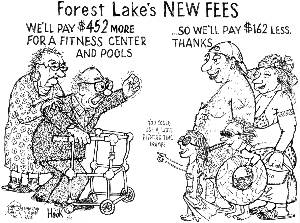NEWS-Forest takes: Subdivision fee hike riles residents
When moving into a subdivision, read the fine print on your contract. That's the hard lesson some Forest Lakes residents are learning after seeing their homeowners' fee jump nearly 200 percent this year.
Meanwhile, some of their neighbors are now paying 30 percent less and say life in the 1,400-home mega-subdivision is going, well, swimmingly.
In fact, it's swimming that's at the heart of the matter, says Randy Clark, who's lived in Forest Lakes for 15 years. Clark is part of a new group dubbed "Forest Lakes Advocates for Change," which is fighting the increased homeowners' fee.
In particular, the group objects to the fact that for the first time, the Forest Lakes Community Association board has ruled that all residents must contribute to the operation of the pool and fitness facilities, even if they don't use them.
"The increase has really affected senior citizens," says Clark, citing many seniors' fixed incomes and the fact that few of them are splashing around in the family-friendly facility. A 59-year-old retired postal worker, Clark says he paid for pool use until his own children left home several years ago and now has no interest in the outdoor facility. Yet his annual bill rose from $228 last year to $682 this year.
He's not alone in his frustration.
"I feel that only people who are using the club should be paying dues," says retired resident Bob Laughlin, a former Forest Lakes board member. "All I can say is that for years, it was understood that when people bought houses in Forest Lakes, membership [in the fitness facilities] was optional," he adds.
Understood, perhaps, but not legally the case, says current Forest Lakes board member Scott Elliff, who adds that the reason membership was optional all those years was that the pools were actually owned by the developer until last year when they were deeded to the Community Association. Now, says Elliff, the facilities truly belong to the community, and as such, are the responsibility of everyone who lives there.
Though the board continued to have residents pay separate dues for the club for one year, Elliff says, he and other board members realized that the money wouldn't cover everything that needed to be done. The board decided to combine the fitness and pool dues with the rest of the homeowners' fees. That was good news for former club members who saw their annual payments drop from approximately $850 to $682.
Resident Barbara Cage says she understands both sides– and she offers a compromise. All residents should pay for the maintenance of community property and buildings, but the actual operating costs– things like heating the pool, cleaning the facility, paying extra staff– should be assigned to people who use it.
"I still think we're all obligated to do our fair share in maintaining the visual aspects of Forest Lakes," she says, "but the actual costs of swimming and tennis ought to be up to one's own discretion."
But Elliff points out that the pool operations account for only 20 percent of the increase, and that the real expenses– maintenance reserves and the cost of hiring the management team– make up more than 60 percent of the increase. There had been no increase in dues for nearly a decade, he says, though the contract allows for a 10 percent increase each year.
In the end, the total dues after the increase still break down to less than $60 a month, which, Elliff says, "is below almost every other comparable community in the area."
Indeed, real estate agent Roger Voisinet confirms that homeowners fees typically range from $30 per month up to many hundreds of dollars, and can often increase steeply over time, something Voisinet says is "an important factor" when considering home pricing.
Elliff offers several tips to those moving into Forest Lakes or any other subdivision. One in particular stands out.
"Read your documents, and don't rely solely on what real estate agents tell you about what is allowed or what the costs are, or what," he adds, "may occur in the future." #
#